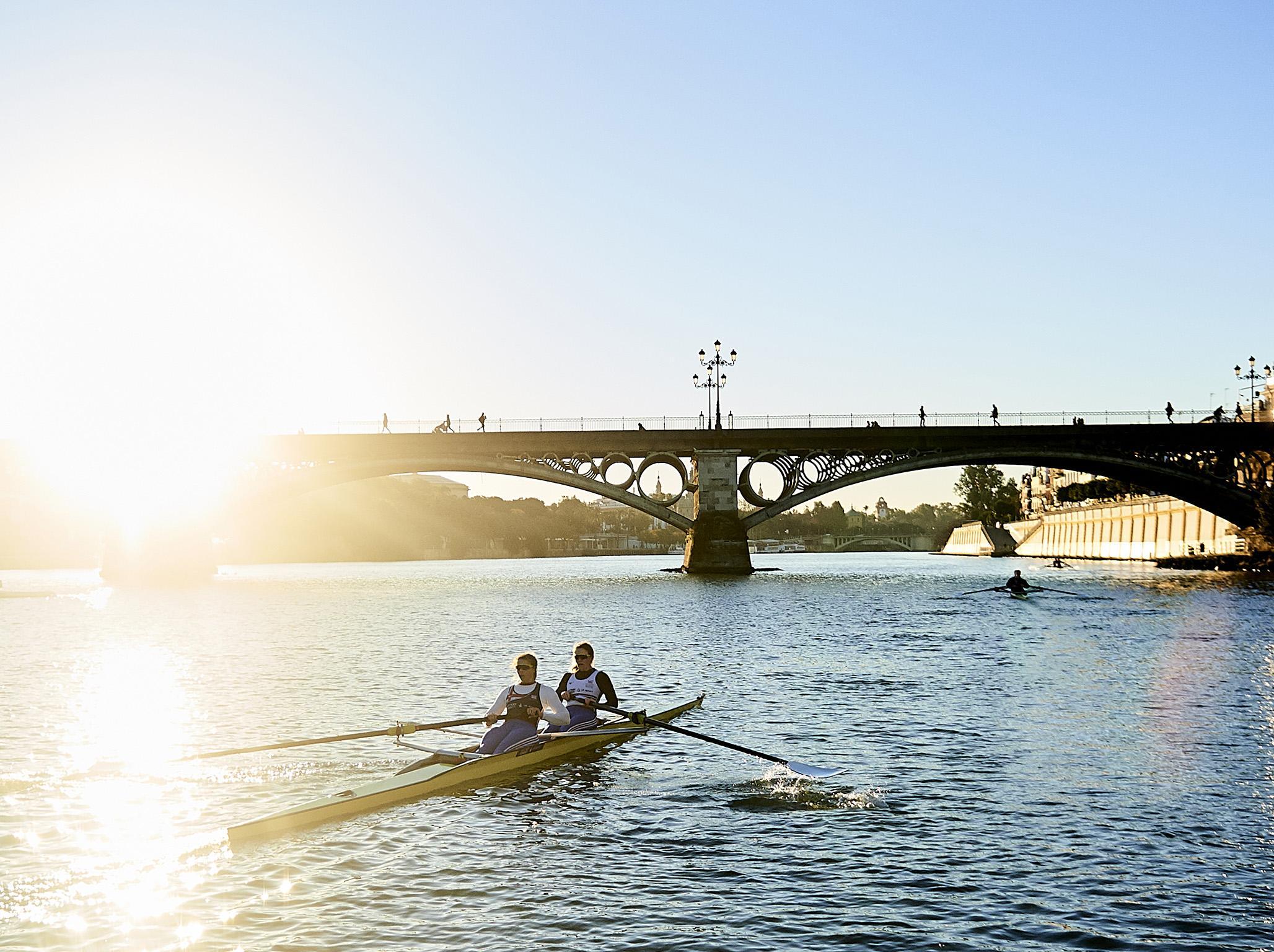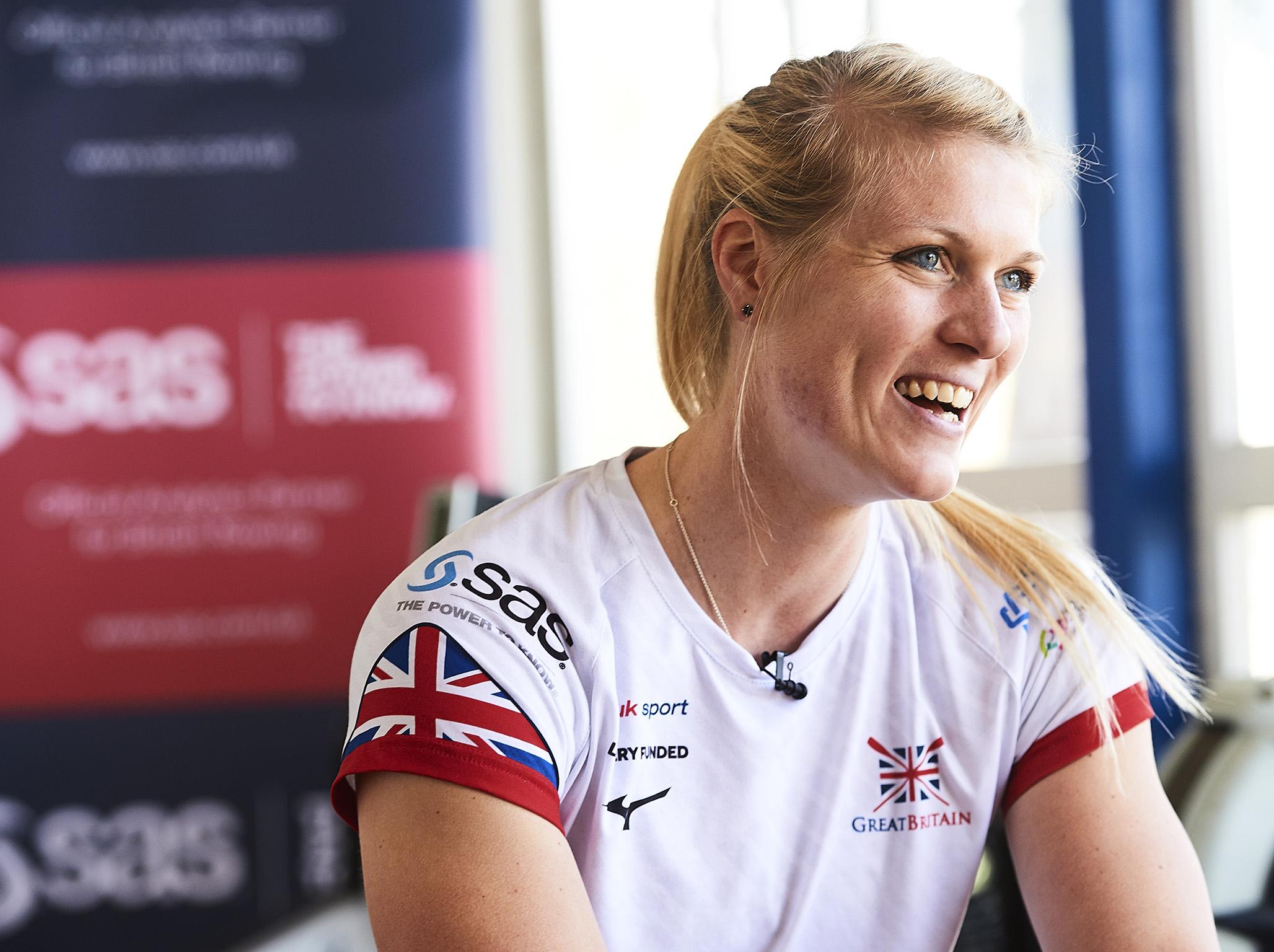How Britain’s future Olympic rowers embrace years of pain for the love of it
At British Rowing’s ‘warm-weather’ training camp in freezing cold Seville, the next generation go through a gruelling routine just have a chance of achieving their Olympic dreams

Your support helps us to tell the story
From reproductive rights to climate change to Big Tech, The Independent is on the ground when the story is developing. Whether it's investigating the financials of Elon Musk's pro-Trump PAC or producing our latest documentary, 'The A Word', which shines a light on the American women fighting for reproductive rights, we know how important it is to parse out the facts from the messaging.
At such a critical moment in US history, we need reporters on the ground. Your donation allows us to keep sending journalists to speak to both sides of the story.
The Independent is trusted by Americans across the entire political spectrum. And unlike many other quality news outlets, we choose not to lock Americans out of our reporting and analysis with paywalls. We believe quality journalism should be available to everyone, paid for by those who can afford it.
Your support makes all the difference.A balmy morning in the very centre of Seville, the banks of the River Guadalquivir lined with graffiti and joggers. Dawn is just breaking; the temperature a couple of degrees above freezing, or perhaps a couple below. A brilliant blue sky, the water as flat as skin. It would be idyllic, if not for the sounds emanating from a single-seater rowing boat in the middle of the river: the unmistakable puffs of pure pain.
For the female rowers of the GB Rowing Team, it is a long and lonely road, the one that ends at Tokyo in the summer of 2020. But before the Olympic trials at Caversham, before next year’s World Championships in Austria, before this year’s in Bulgaria, before the Europeans in August, the three World Cup regattas this summer, before the seasonal trials in April, it’s this: a month of graft and grunt at what is laughably being described as British Rowing’s warm-weather training camp.
Actually, once the sun comes up it does get quite pleasant: not T-shirt weather, exactly, but certainly preferable to -4C and a freezing lake in Berkshire. But the balmy afternoon sun is pretty much the only remotely pleasant aspect of their stay. Triple training days. Weights and erg sessions. Flamingly early starts. “If we do the programme right,” says quad sculler Mathilda Hodgkins-Byrne, “it’ll completely rinse us by the end. But it should.”
Around two dozen of Britain’s finest female rowers have made the trip to southern Spain, and SAS, the Official Analytics Partner of British Rowing, have invited The Independent out here for a couple of days to have a look. The vast majority are under the age of 26, and are yet to win an Olympic medal. And so all the while, there’s the knowledge that their performance, their output, is being scrutinised in minute detail for signs of weakness. Not just by their coaches, either. The Norwegians and the Dutch are also training here, and one imagines there have been a few furtive glances across the gym and the breakfast table.
One thing you quickly learn about rowers is that they are not like the rest of us. Basically, they’re better. Not just physically, although that’s probably the first thing you notice. When you’re a female rower, six feet is pretty much a basis for negotiation. Their bulk and power is sustained by a gargantuan calorie intake, consisting of two breakfasts before many of you will have had their first.
“I don’t actually monitor what I eat,” says Hodgkins-Byrne, an assuming 23-year-old from Hereford who bronze at last year’s world championships. “I’m probably one of the worst in the squad for that. Some girls weigh everything. I look at normal people, the amount they eat, and I don’t know how they live off that.”
But it’s what lives upstairs that really distinguishes a rower from a mortal. Very little in elite sport can compare to the intense and brutal physical pain that besets rowers during the closing moments of a big race. In fact, pain is pretty much a fact of daily existence: not the sharp, fleeting impact pain of the punched boxer or the felled rugby wing, but a sort of wrenching, prolonged torture, ratcheting to an agonising crescendo that only victory can really balm.
“Rowing is a sport you can only excel in if you love training,” says Zoe Lee, a silver in the eight at the 2016 Rio Olympics. “The majority of what we do is training. We’re definitely all a bit nuts. Because it hurts. And in a race, it hurts really early.”

How do you push through it? “When it’s really hurting?” asks Holly Hill, a 2016 Boat Race winner who races with Melissa Wilson in the women’s pair. “Part of it is that you’re surrounded by people that are also pushing themselves as hard – or harder. That’s really motivating in itself. You know that it’s going to be OK. The pain I’m in now – in my legs, in my lungs – won’t hurt more than the pain I’ll feel for a very long time if I stop and don’t give everything.”
A high pain threshold helps, then. But really, it’s more about what you’re prepared to give than what you’re prepared to take. As the squad enjoy a couple of hours off in the early afternoon before their final training session of the day, a few of them stroll down to the banks of the water, get down on the ground, and do press-ups. Just, you know, for the hell of it.
And so not content with pushing their bodies to the limit, you find an impressive number of rowers who want to explore their capabilities in other directions, too. Lee – more correctly, Dr Lee – somehow managed to combine an Olympic rowing career with a PhD in geography at King’s College London, although she admits there were times when the studies took a bit of a back seat. How long did it take her? “From start to finish, seven years,” she says.
You can’t call them ‘sacrifices’, apparently. You hear that more than once. But when you choose the rowing life, you do lose out on certain things. “I had some amazing friends at university,” Lee laments. “I was part of a really big group that did similar degrees. And now they’re all married, kids, nice houses, moved on to different jobs, and I wasn’t able to go to any of their weddings, birthday parties. Eventually I just lost contact with people I feel real affection for. That’s definitely been the hardest thing.”
“I feel guilty about it,” says Hodgkins-Byrne, who is currently fitting a chemistry degree at Reading University around her athletic career. “Because at times, it seems like I take advantage of my friends. I’ll only see them in lectures, or message them – ‘I need the notes, can you give me the notes?’ And then, they’re like, ‘We’re going out later, do you want to come?’ And I’m like, ‘Sorry, I can’t.’ That’s really hard.”
And perhaps the most brutal thing of all is that at the end, there are no guarantees. You can do all the sessions, pass all the tests, miss all the weddings, and still lose. Of all the agonies and indignities rowing throws at you, by far the worst is defeat. For Hodgkins-Byrne, whose quad boat failed to qualify for the last Olympics, the memories of their near miss remain raw. “We never, ever want to go to Olympic qualifiers again,” she insists. “That experience is something I wouldn’t wish upon anyone.

“It’s not like a normal race, where people are upset they haven’t got the medal. You can genuinely see their career’s over. Like, everything they put into it, they now don’t have. They’re completely helpless, completely broken. I’ve never been in a boat park where people are genuinely distraught, and crying under the boats.”
And yet, as the aches begin to accumulate – another 10 strokes, another five lifts, another two years – for those who commit, the rowing life begins to take on a certain empowering fascination: one not entirely independent on results and times and precious metal, but not entirely dependent on it either. For the elite rower, rowing becomes something they internalise, embody, slip into like a glove.
“I could be in the best shape I will ever be, but someone could drop an oar,” says Lee. “They could fall down the stairs in the morning. So, for me, it can never be about the outcome. There’s so much passion and fire about competing at the Olympics, but ultimately that’s one week of the four years. You’ve got to love it.”
SAS, the leader in analytics software and services, is an official partner of British Rowing. Further information at www.sas.com
Join our commenting forum
Join thought-provoking conversations, follow other Independent readers and see their replies
Comments